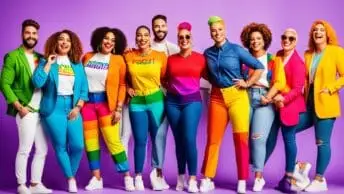What makes a successful entrepreneur stand out today? It could be a strong personal brand. For LGBTQ+ entrepreneurs, this is essential for success.
Jennifer Brown is a big name in personal branding. She speaks on the importance of creating a brand with purpose. This is especially crucial for those in the LGBTQ+ community.
Brown has shared her insights on the “Personal Branding for the LGBTQ Professional” podcast three times. She talks about showing the world your true story and beliefs. Her company, Jennifer Brown Consulting, has helped big companies for ten years. They focus on making workplaces more diverse and inclusive.
Jennifer Brown’s book ‘Inclusion: Diversity, the New Workplace, and the Will to Change,’ is on Amazon. She wrote it to share her knowledge and enhance her brand. The book was part of her long-term strategy, underlining her forward-thinking approach. Her advice is useful for everyone, showing its wide appeal.
Telling your story builds trust with potential clients. Strategic planning and branding are key for lasting success. LGBTQ+ entrepreneurs everywhere can learn from Brown’s wisdom and experience.
Discover how sharing your story and values can impact your business. Keep reading for more insights and tips in this guide.
Introduction to Personal Branding for LGBTQ+ Entrepreneurs
Personal branding is more than just a logo or colour scheme. It’s about creating an authentic image that truly connects with people and potential clients. Jennifer Brown, a top consultant in diversity and inclusion, stresses this point for LGBTQ+ entrepreneurs.
On her podcast, she talks about how personal branding requires embracing your unique story and values. This helps build a real connection with your audience.
Jennifer Brown has helped big Fortune 500 companies for over a decade. She focuses on teaching effective strategies and leadership skills that include everyone. Her work shows the power of knowing who you are in business today.
Jennifer Brown also wrote “Inclusion: Diversity, the New Workplace, and the Will to Change.” This book boosted her profile and opened new opportunities. It shows how personal stories can make your brand more influential.
Jennifer Holloway shares her knowledge from 15 years with big names like HSBC and Uber. She highlights how critical personal branding is for building trust.
Good personal branding must be clear, connect well, and be authentic. This helps entrepreneurs stand out and build strong relationships with clients. For LGBTQ+ business owners, it’s key to showing what makes you unique in a crowded market. By using LGBTQ+ business strategies, your brand can truly reflect your identity and vision. This makes your business not just recognisable, but relatable and trusted too.
The Importance of Authenticity in Personal Branding
Authentic branding is crucial for creating a real business image, especially for LGBTQ+ entrepreneurs. Jennifer Brown believes that a strong personal brand is all about being genuine. This builds trust and makes a big difference in the LGBTQ+ industry.
About 66% of employers look at an individual’s online presence before hiring, says CareerBuilder. This shows how important being real in your branding is. It’s not only for now but also helps in the future.
Having a unique personal brand sets you apart in a crowded field. Authentic branding draws in people who share your values. This leads to partnerships that match your goals.
Authentic branding also means more trust from employers and clients. Knowing your strengths and what motivates you helps make your story intriguing. Keep your brand true to your identity by regularly updating it.
Today, 60% of employers check social media to learn about job seekers. This fact shows the demand for being genuine online. Being authentic helps LGBTQ+ entrepreneurs stand out and be trusted in their field.
In conclusion, LGBTQ+ entrepreneurs who focus on authenticity can develop business images that genuinely connect with people. This builds trust and brings lasting success.
Leveraging Your LGBTQ+ Identity in Branding
Using an LGBTQ+ identity in branding is effective for promoting inclusion and standing out in the market. Jennifer Brown shows this with her work at Jennifer Brown Consulting. She advises big companies on how to embrace diversity in their branding.
Jennifer has spoken on podcasts about the importance of LGBTQ+ identity in branding. For nearly ten years, her consultancy has specialized in training for unconscious bias and leadership skills. This helps companies to be more inclusive.

Jennifer Brown’s new book, “Inclusion: Diversity, the New Workplace, and the Will to Change,” boosts her role as a leader in thought. It’s up for grabs on Amazon. In it, she highlights how sharing personal stories can deeply connect with people and foster change.
She plans to engage more in high-level talks that cover various areas. Just like how gender identity enhances a brand, sharing personal stories aids in social progress. Entrepreneurs become part of a bigger story that inspires by sharing their struggles and successes.
Her work exemplifies the power of including LGBTQ+ identities in branding. As her consultancy grows, it continues to encourage companies to embrace these strategies. By doing so, they significantly improve their position in the marketplace.
Utilising Social Media to Build Your Brand
Social media marketing is key for LGBTQ+ entrepreneurs in building their brands. A survey shows 84% see social media as vital for their branding and finding chances. LinkedIn’s group of over 44,600 members helps in creating strong online brands, making connections, and getting seen.
Being truly engaged on social media can make an entrepreneur’s online presence stronger. A study indicates LGBTQ+ entrepreneurs who are active online see a 67% rise in followers and interactions. Sharing news and insights about their industry also helps establish their authority and builds their brand, as noted by 91% of entrepreneurs.
Posting detailed articles on sites like LinkedIn boosts brand recognition and trust by 73%. Also, LGBTQ+ entrepreneurs who share visual content related to their work see engagement soar by 63%. Using tools to manage social media can save five hours per week. This boosts productivity and increases engagement by 40%.
Joining industry groups on social media enhances LGBTQ+ brand engagement, growing networking chances by 55%. Setting aside specific times for social media also helps. Entrepreneurs find this increases consistency and the quality of their content by 60%.
The Role of Networking and Community Involvement
For LGBTQ+ entrepreneurs, networking and getting involved in the community are key to growing professionally. OutBüro suggests that being active in discussions can greatly boost one’s personal brand. It helps build professional relationships and get valuable support from the LGBTQ+ business community.
When entrepreneurs connect with others who share similar goals, they help each other grow. This exchange of ideas and support improves their reputation. Being well-connected makes a brand more authentic and trusted, leading to new opportunities that match their values.
Attending industry events and networking meets is very beneficial. They are great places to find mentors, partners, and supporters. Being consistently active keeps your brand in the spotlight, whether you’re interacting online or face-to-face.
Having a strong online presence is also crucial. It lets people find and connect with you more easily, which strengthens your network. This ongoing effort enhances your brand’s visibility and impact in the business world.
LGBTQ+ entrepreneurs can turn their connections into supporters by sharing their personal stories well. This, along with engaging in the community, proves just how vital networking is for professional success and support.
Challenges Faced by LGBTQ+ Entrepreneurs and How to Overcome Them
LGBTQ+ entrepreneurs often deal with discrimination and a struggle to get money for their businesses. A 2020 ruling by the Supreme Court helped a bit. It made it illegal to fire someone for being LGBTQ+. But, in 27 states, you can still lose your job if you’re LGBT. This makes things tough for LGBTQ+ business owners.
A 2016 study by StartOut found that 40% of LGBTQ+ entrepreneurs hide their identity. They fear it might stop them from getting funding. Lesbian entrepreneurs face more issues. Only 3% make more than $5 million. This is low compared to 12% of gay men who do.

2020 was a tough year for Black-owned businesses. 41% had to close. This was much higher than the 17% of white-owned businesses that closed. Venture capital also tends to go to white, male-owned businesses. Black and Latinx women received very little, only 0.27% and 0.64% of the funding between 2018 and 2019.
To tackle these issues, it’s important to use LGBTQ+ business resources. Organizations like the National Gay and Lesbian Chamber of Commerce and Out & Equal can help. They provide money, chances to meet others, and guidance to grow.
Getting certified by the National LGBT Chamber of Commerce also helps. It opens up opportunities and resources to grow your business. Sharing information about who you work with can help too. It gives a clearer view of the business world, leading to better support and more inclusion.
To fight these challenges, start by educating your team about unconscious bias. Work with minority-owned businesses and hold diversity workshops. These steps can turn challenges into chances for growth. Through resilience and embracing their unique identity, LGBTQ+ entrepreneurs can create a thriving and inclusive business world.
Personal Branding
Jennifer Brown has shown how crucial a strong personal brand is for career growth. It helps professionals show off their skills and knowledge. A well-built personal brand makes you more credible and helps you connect with your audience.
Personal branding is all about telling your story. Authentic stories help make a memorable impact and reflect your values and identity. An interesting fact: 92% of people believe more in individuals than companies when choosing what to buy. This shows the power of a personal connection in branding.
Personal branding also sets you apart by highlighting what you do best. A clear positioning statement shows what makes you unique. This makes it easier to grow in your career and get noticed by clients and employers.
Using SEO-friendly keywords on websites and online profiles is key. It helps your business persona stand out online. Consumers find content from real people more trustworthy than that from brands. That’s why a complete LinkedIn profile is crucial for professionals.
Strong personal brands do much better than those less known, by up to 73%. Nowadays, 64% of shoppers choose brands with similar beliefs and values. Personal branding is a chance to really connect with what your audience cares about. It’s essential for ongoing success and making a mark professionally.
Mental Health and Self-Care for LGBTQ+ Entrepreneurs
Mental health support is crucial for LGBTQ+ entrepreneurs. They face a tough business world. Wellbeing is essential for growth and success. Entrepreneurs must look after themselves to handle stress and avoid burnout.
Queer-Owned, an important organisation, highlights the need for work-life balance. Self-care greatly benefits mental health and overall wellbeing. Mindfulness, physical activity, or hobbies can help achieve this balance.
LGBTQ+ youths face more mental health challenges. They’re 1.5 times more likely to have depression and anxiety than straight peers. It shows the need for strong mental health support in the LGBTQ+ business community.
Being an LGBTQ+ entrepreneur comes with extra stress. In 2022, over 300 anti-LGBTQ+ bills were proposed, adding to that stress. Thus, focusing on wellbeing is crucial in business plans. Business leaders like Junior Mintt and Francie Fiammata show how self-care and mental health focus can bolster resilience.
Conclusion
Building a personal brand as an LGBTQ+ entrepreneur is more than just a task. It’s about being true to yourself and talking wisely. It’s also about growing and changing when needed. Success depends on being real and ready for competition.
Victoria Paris, a social media star, showed how important regular posts are for connecting with people. She reached a million followers super fast. This shows digital spaces hold big opportunities. Entrepreneurs should focus on being regular and genuine to build strong connections.
Getting involved in networks and communities is key too. Places like OutBüro offer great chances for LGBTQ+ business people to meet, share, and grow their influence. Teaming up with similar influencers and brands can help spread their brand wider.
It’s also vital to look after your mental health and wellness. Queer-Owned shares that balancing work and life helps with success. Using your personal brand well can lead to business opportunities and make a real difference in society and in the business scene.






